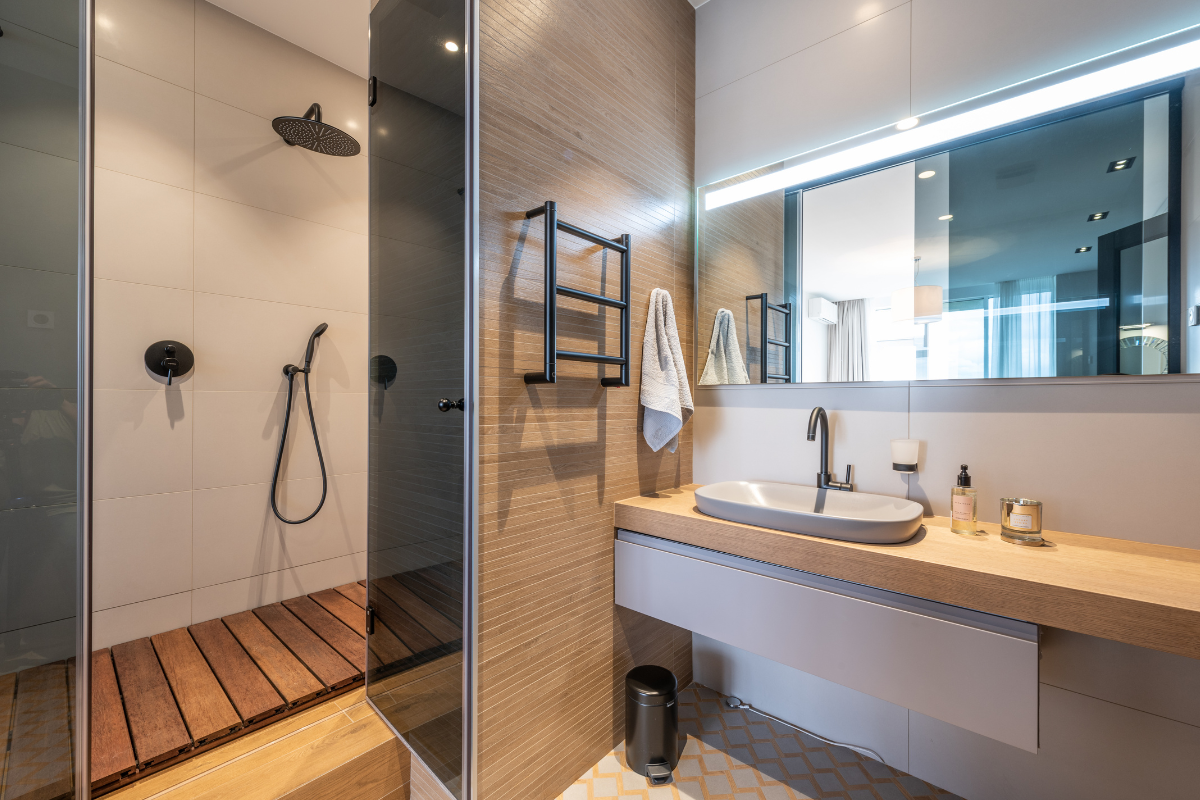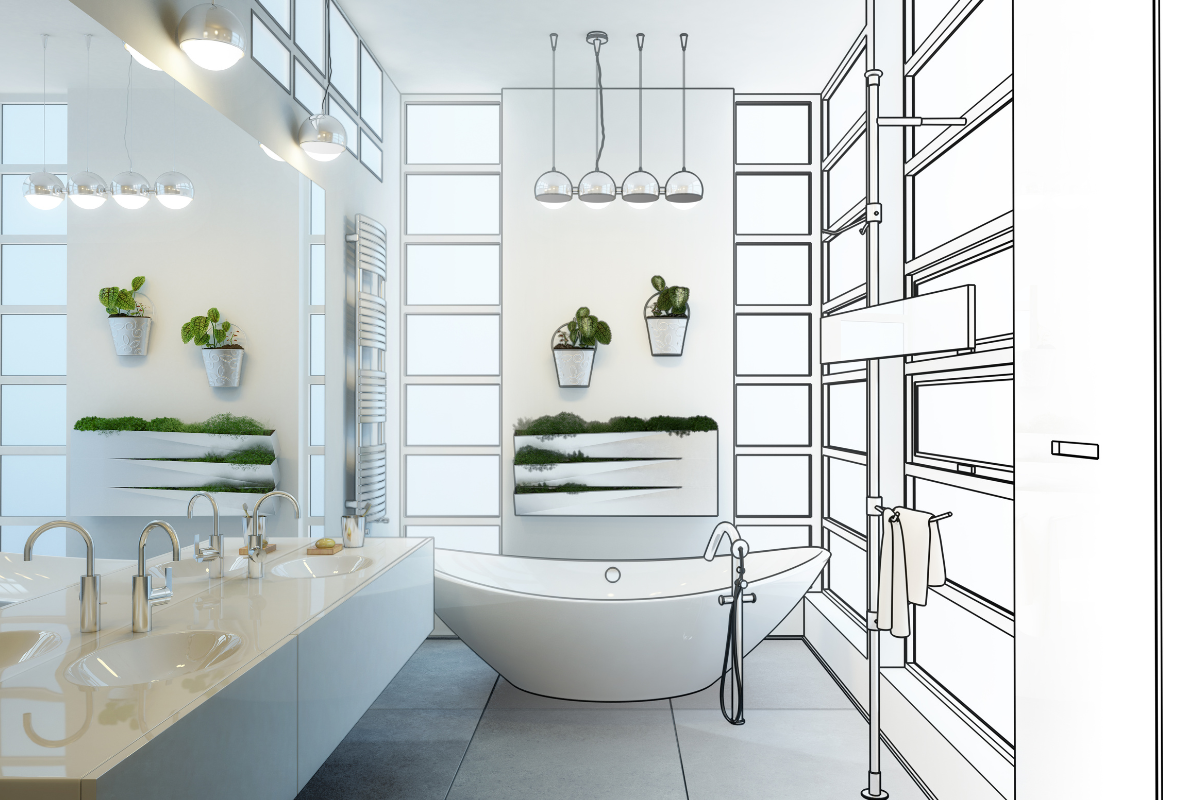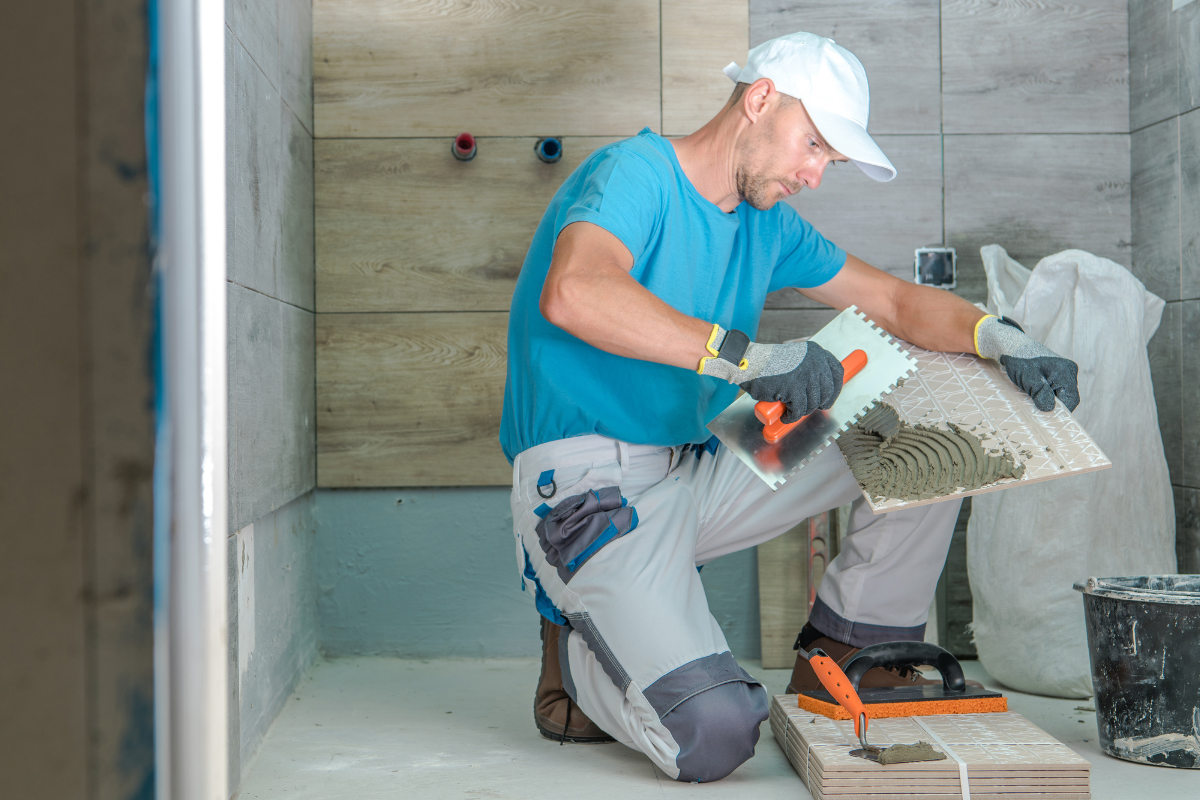Whether you are preparing your home for the market, want an updated comfortable space or are tackling necessary repairs, we want to help you realistically understand how much it's going to cost.
So let’s get to it.
![bathroom cost]()
Average Cost To Renovate A Bathroom in Australia
According to recent data from the Housing Industry Association of Australia, the average spend for a bathroom renovation currently sits at around $26,000.
However, this price can be affected depending on where you live, the size of the bathroom, structural integrity and whether the layout needs to be altered in terms of the electrical and plumbing fittings.
For instance, a simple, mid-range renovation on a small bathroom may only cost between $10,000 - $15,000. Conversely, a large-scale, complex bathroom renovation with high-end materials could cost upwards of $40,000 or more.
To put this into context, let's break the cost of renovating a bathroom down into three ranges: high, medium and low. We’ll take a closer look at individual pricing criteria further on, but as an indication of what to expect:
High Range — Above $30,000
The over $30,000 range provides luxury bathroom renovations, including the use of premium materials and fittings. This may include porcelain or marble tiles, double showers, hanging vanities and an opulent bathtub.
For this higher price, you are able to add any design elements you desire and are not restricted to the current layout. You will be working with a variety of experienced and qualified trades who will handle every aspect from start to finish.
Medium Range — $15,000 - $30,000
The medium range is what most people budget for with their bathroom renovation. You can expect a large range of tiling, shower designs and gorgeous bathtubs to choose from. You may be slightly more restricted when it comes to changing plumbing or electrics, but as a whole, this range assures a great bathroom renovation. Particularly for those who know where in the bathroom is best to invest their budget such as quality tiles and tapware.
Low Range — Under $15,000
It is to be expected that a lower budget will restrict your choices. You will likely have to opt for large-format porcelain tiles, framed shower screens and all-in-one laminate vanities. While some professionals may offer low-range prices, you may have to work with a less-experienced professional depending on how low your budget is.
Please note: Service.com.au always encourages our readers to beware of falling victim to low prices that promise a lot. While it can tempt the best of us, often long-term issues can arise as the job has not been properly carried out. In a bathroom where water is involved, it is particularly important that no corners are cut.
Factors Influencing Bathroom Renovation Costs
Of course, $10,000 to $40,000 or more is a fairly broad price range, so what should you expect your bathroom renovation to cost? This will depend on a variety of factors including:
- The bathrooms size, the bigger the bathroom the higher the cost
- The chosen materials and fittings
- Labour costs for plumbers, tilers, waterproofers and more
- Whether any layout changes are being made
- Whether any water/structural damage needs to be addressed\
- Whether any permits or inspections are required
Trade Costs
When it comes to hiring tradies, prices can also vary depending on the skill of the individual and the tasks they’re involved with. You may be quoted at an hourly or per square metre rate or for the total job, we recommend always asking for an itemised quote so you know exactly what to expect.
We suggest also clarifying whether the cost of their services is inclusive or exclusive of materials used, so there is a clear understanding of the costs involved from the outset.
To give an idea of the labour costs involved, we’ve outlined some average rates for different trades that may be involved in your bathroom renovation.
| Trade |
Labour Costs |
| Plumber |
$100 - $150 an hour |
| Electrician |
$80 - $140 an hour |
| Tiler |
$30 - $170 per square metre (walls and floors) |
| Waterproofer |
$35 - $200 per square metre |
| Builder |
$70 - $120 an hour |
It’s best to compare bathroom renovation quotes from several qualified tradespeople to get an idea of the price range and select one based on their past customer reviews, photos of their work and their experience.
Remember, paying a fair price for the services of a qualified tradesperson is the best way to ensure that you will be receiving high-quality workmanship. This is why it’s important not to only base your decision on the cheapest quote you receive as price can be indicative of the level of service and quality of workmanship provided.
You can potentially save costs by hiring individual contractors to handle each component of the bathroom renovation separately, as opposed to hiring a bathroom renovation specialist or builder to manage the separate tradies.
Material & Fixture Costs
The following is a breakdown of material and fixture costs across different budget ranges. If you’re on a budget but have a little wiggle room, we recommend doing a mixture of low to mid-range items to achieve the most durable outcomes.
1. Vanity
The perfect place to store all your bathroom and hygiene related bits and pieces, vanities are an essential in any bathroom. You should expect to pay:
- Low-Range: $300 – $700
Prefabricated vanities with melamine or laminate finishes.
- Mid-Range: $800 – $2,500
Custom or semi-custom vanities with engineered wood or stone benchtops.
- High-Range: $3,000 – $6,000+
Custom vanities with premium finishes, such as natural stone tops and solid timber cabinetry.
2. Sink
An absolute essential for washing your hands, face and brushing your teeth, you should budget as follows for a bathroom sink:
- Low-Range: $100 – $300
Standard ceramic or acrylic sinks (often integrated into vanities).
- Mid-Range: $300 – $800
Porcelain, ceramic or glass vessel sink with more stylish designs.
- High-Range: $900 – $2,000+
Designer sinks made from stone, marble or premium ceramic often with custom shapes and finishes.
3. Toilet
From basic to brilliant, toilets come in a surprisingly broad range of options. While one with lots of bells and whistles can be fun, we suggest prioritising one that is easy to keep clean such as those with an enclosed cistern. Prepare to spend:
- Low-Range: $150 – $500
Basic close-coupled toilets with minimal design features.
- Mid-Range: $600 – $1,200
Back-to-wall or wall-hung toilets with soft-close lids and water-efficient systems.
- High-Range: $1,300 – $3,000+
Premium wall-hung models with concealed cisterns, smart features like heated seats or integrated bidet functions.
4. Bathtub
Not always an essential but always a luxury, depending on your preferences you should expect to spend the following on a bathtub:
- Low-Range: $300 – $800
Acrylic or fibreglass bathtubs, basic drop-in or freestanding styles.
- Mid-Range: $1,000 – $2,500
Acrylic or enamel steel bathtubs with more stylish, freestanding designs.
- High-Range: $3,000 – $8,000+
Freestanding stone or cast iron bathtubs, with designer or custom-made options.
5. Shower Screen
Definitely preferable over a shower curtain, the right shower screen can make or break how your bathroom renovation turns out in terms of visual appeal. Expect to spend:
- Low-Range: $400 – $800
Framed glass or acrylic screens with standard fittings.
- Mid-Range: $900 – $1,800
Semi-frameless or fully frameless glass screens with high-quality finishes.
- High-Range: $2,000 – $4,000+
Custom frameless glass screens with premium fittings or bespoke designs.
6. Tapware
A selection where you can make a big impact, spending a little more on tapware can provide budget renovations with a deceptively luxurious edge. Your budget should allow:
- Low-Range: $100 – $300
Basic chrome or stainless steel taps, including mixers and showerheads.
- Mid-Range: $400 – $1,000
Higher quality taps in brushed nickel, matte black or brass finishes.
- High-Range: $1,100 – $3,000+
Designer tapware with custom finishes like brushed gold and bronze or advanced technology like touchless faucets.
7. Tiling
From sleek and understated to colourful and creative, tiling choices can be a lot of fun and provide you with a chance to inject some personality into your renovation. Prepare to spend roughly as follows:
- Low-Range: $30 – $60 per sqm
Basic ceramic or porcelain tiles.
- Mid-Range: $70 – $150 per sqm
Porcelain, stone-look or larger-format tiles with more design choices.
- High-Range: $160 – $300+ per sqm
High-end tiles, such as natural stone (marble, travertine) or hand-made tiles.
8. Towel Rails & Similar Fixtures
Absolutely essential and important not to overlook or scrimp too heavily on, towel rails and similar fixtures, like tapware, can heavily impact the final look of your bathroom. With a huge array of choices and features available, you should budget as follows:
- Low-Range: $50 – $150
Basic chrome or stainless steel towel rails, toilet roll holders and robe hooks.
- Mid-Range: $200 – $500
Higher quality fixtures in finishes like matte black, brushed nickel or brass.
- High-Range: $600 – $1,500+
Designer or heated towel rails with premium finishes and smart features.
As the above indicates, it is possible to not spend a huge amount on materials and fixtures when renovating your bathroom. However, it is worth keeping in mind that you very often get what you pay for, so where possible it is worth investing in higher-quality products.
Ultimately, if you plan carefully and are creative with your choices, a beautifully renovated bathroom is possible no matter your budget.
![Bathroom renovation plan and process]()
The Bathroom Renovation Process
While undoubtedly exciting to renovate your bathroom, it is a good idea to do some research and have a general understanding of the process involved and what will occur within your home.
This can help to alleviate any stress that arises during this time and ensure you have a realistic expectation regarding timeframes.
Typically, a bathroom renovation will roughly involve the below steps.
Design the Bathroom
This is the first part of the process for renovating your bathroom. You can lay this out on a piece of paper, within a folder, on an online software program or with the help of your chosen professional.
You may like to bring home some tile samples and make decisions on fixtures including the toilet, vanity and shower screen at this time. This will allow you to order what you need in advance and avoid delivery delays.
Likewise, contacting various trades for quotes and ascertaining their availability can be crucial to not only budgeting but also keeping your renovation on track.
Strip the Existing Bathroom
The fun part! Stripping your old bathroom will come next, expect a lot of noise and mess as your tradies (or you) get to work preparing the area for what is to come. If undertaking this step yourself, be careful to turn off your water when removing taps, sinks and toilets and watch out for underlying electrical cables.
Plan the Plumbing
For those opting to make changes to the plumbing system in place, you are going to need to enlist a plumber and/or electrician to relocate the chosen systems. This is also a crucial moment for checking fittings.
Reinstall the Walls & Floors
Once the plumbers and electricians have done the necessary work behind the walls, floors and ceilings, it is time to seal the walls and floors back up. Depending on the extent of the renovation and how much was demolished or changed, this may be a quick job or a full-day undertaking.
Fibre cement sheeting or another highly water-resistant material is required for these wet areas and ensures a solid foundation for your new bathroom.
Waterproofing
The waterproofer will now begin waterproofing all wet areas. This is an extremely important task in protecting the structural safety of your bathroom and home from water damage and is vital to its longevity.
Waterproofing usually involves the application of a speciality membrane across the entire bathroom floor, within the shower enclosure, around bathtubs and part way up the walls.
Typically involving 2 to 3 coats which must dry for a full day in between, this process can feel lengthy, but must not be rushed.
Tiling
After the prep work has been carried out, the tiler will begin installing the tiles. Once done, you’ll then need to wait 24 to 48 hours for the mortar to set and dry before grouting can be completed. We suggest giving the space a cursory clean once the grout is dry and before you move on to the next stage as once everything is installed some spots may be harder to reach.
Fit-Out
Everything is added now! The bathtub, sinks, showers and everything in between can now be installed, meaning you’ll need to get your tradies back on site. This is when you will begin to have a real feel for your new bathroom’s look.
Following a final cleaning and decorating with towels, plants, candles and more, you can now enjoy your completed bathroom renovation!
How Long Does a Bathroom Renovation Take?
So given how much is involved in the process, you’re no doubt wondering ‘How Long Does a Bathroom Renovation Take?’.
Initially, you will need to research, plan and design your bathroom. If you do not require any huge structural changes this process will take between 6 to 8 weeks. Allowing for design development, selection of materials/fittings and obtaining a variety of quotes.
The actual work should take 2 to 3 weeks minimum, depending on the scale of your project. Your chosen builder or trades should be able to provide you with a time estimate. Variables that can affect your timeframe include relocating plumbing/electricals, large areas to be tiled and unforeseen events such as structural repair work due to past water damage.
Who Do You Need to Renovate Your Bathroom?
Who you will need to hire to help with your bathroom renovation will depend on how much (if any) of the work you intend to do yourself and your personal preferences. Some bathroom renovation companies offer an all-in-one service with a team of trades who will handle the entire process from start to finish for you. However, while convenient, this can be more expensive.
If you prefer to manage the project yourself and engage different trades separately, you will likely need a:
- Builder
- Electrician
- Plumber
- Waterproofer
- Tiler
Depending on the scale of the project you may also wish to hire:
- An architect or designer
- A cabinet maker
Not sure where to begin with sourcing all these experts? Service.com.au provides a range of trade professionals to choose from all in one place.
We recommend obtaining several quotes to ensure you get the fairest price for your job and choosing the professional/s you feel best understands your needs and the project. We also strongly recommend only working with those who hold the required qualifications and licences. That includes any builders, plumbers, waterproofers and electricians.
![Tradespeople for bathroom renovation]()
Are There Any Bathroom Renovation Alternatives?
Renovating an entire bathroom is neither a small job nor an inexpensive one. If it simply is not on the cards right now, there are a few alternative ways to make your bathroom feel new without completely starting over.
For example, you could simply replace your vanity, it is amazing the difference this can make in even the oldest bathrooms. Changing out tapware, replacing the shower screen or repainting your tiles can also be very effective.
So long as there is no water damage that needs to be addressed, making some simple updates and cosmetic changes may be all you need to create the space you’re after.
Further Reading:
Please note that all prices mentioned are to be used as an approximate guide only and are accurate at the time of writing. These prices may differ by location and at the discretion of each business.


